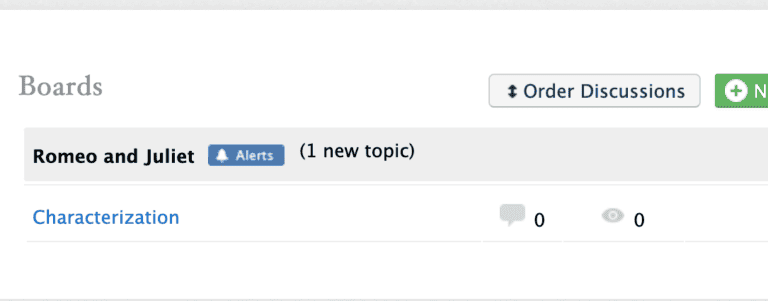REAL Teacher Feature: Robby Uhrman
Thank you to Robby Uhrman for sharing his REAL life with us! Robby is an English teacher at Hutchison School in Memphis, Tennessee. Here are his thoughts on discussion, R.E.A.L.®, and learning.
Hometown: Memphis, TN
Current City, School, Teaching Assignments:
8th grade English teacher at Hutchison School in Memphis, TN.

Describe yourself as a student in three words:
Curious, enthusiastic, reflective.
Who was your favorite teacher and why?
Coach Dennis King, Brentwood High, 1994. Coach King inspired regular class discussion about complex literary texts. After giving his assessments, he would grant us the opportunity to argue why our answers that were marked wrong were worthy of additional points or consideration. He would listen intently, and every now and then he would honor point redemption if he was moved by our arguments. This taught me to frame arguments and support my reasoning – skills worth far more than the points he awarded on those assessments.
When it comes to class discussion, what is your “why”? What feels compelling and important about teaching these skills?
Students often challenge me with the age-old question, “Why do we need to learn this?” That typically comes up when we are diagramming sentences or studying symbolism. Now, I can explain why it’s worthwhile to diagram sentences and identify symbols in texts, but engaging in civil discourse is embedded in everything we do. I can’t imagine a career where one won’t need to share their knowledge with those working above or below them. Additionally, grappling with complex ideas with colleagues or loved ones is how we grow. It’s how we respond to adversity. These skills prepare students for life by empowering them with tools to use their voice with confidence.
Take us back to the first R.E.A.L.® Discussion you led – what were you worried about going into it? What surprised you about it?
I think I may hold the record for fastest implementation of the R.E.A.L.® discussion format. We received training online, and I ran with it the next day. Emily matched my enthusiasm, then she kindly asked if I’d had students complete the survey. I hadn’t read the launch instructions, but I knew our argumentative essays on the value of homework were perfect for the R.E.A.L.® format. Even with skipping the introductory steps, my students thrived with the discussion protocols. I was surprised to learn what students could do when I stepped (completely) out of the way. The success was 100% seeing my students thrive in this format. I was inspired to plan (appropriately) for the next discussion.
How do you orient your students to R.E.A.L.®?
After learning the nuts and bolts of a R.E.A.L.® discussion, I now give students a schedule and fair notice of when the next discussion is coming. As we move through a novel unit, I introduce supplemental texts (as I normally have), and students know that a R.E.A.L.® discussion is scheduled well in advance. I let students know that a R.E.A.L.® discussion is an opportunity for them to share their knowledge about the texts we have studied. I tell them that their thinking may change in a R.E.A.L.® discussion, and that’s okay.
I would advise a teacher on the cusp of starting their first discussion to lean into the process. After three R.E.A.L.® discussions, I can implement this discussion format without interrupting at all. The students manage the entire class. This can be uncomfortable at first, but leaning into that discomfort opens a space for students to take ownership of the material and their voices.
How do you go about planning for a R.E.A.L.® discussion? What have you figured out about the types of texts or DQs that work well for your students?
First, I need to envision why we are devoting an hour of class to the R.E.A.L.® discussion. What are we ready to discuss? Where are we in the unit? I find this works best in the middle or near the end of a learning unit. For texts, I have found that a core text and 1-2 supplemental texts/articles work well. For the DQ’s, I have written them myself, but I also experimented with giving students choice here as well. For one unit on Maus by Art Spiegelman, I wrote five DQ’s and let students in all classes rank those questions in order of interest for taking on as DQ’s (using Mentimeter). I found the students are more eager to dig into the work if they had a voice in determining which DQ’s we pursue. For structure, I let them know the R.E.A.L.® discussion is scheduled. Also, I give them a full day in class to complete the DQ evidence and analysis portfolio work.
When it comes to discussion, what are your top 3 learning goals for your students?
Girls explicitly mark their discussion goals in the portfolio (R, E, A, or L). From a global view, I want my students to: develop confidence in their ability to support their thinking with evidence from the text in a class discussion, respond to opposing views with respect by addressing the ideas and not the person, and synthesize their learning by reflecting on the discussion at the end and acknowledging moments that challenged their perspective – or even changed their mind.
Can you think of a moment you’ve experienced this year or last where a student had a breakthrough during a discussion? What did it look like? How did that feel as a teacher? Did you see it have an impact on the other students?
Yes. Our DQ2 on Maus involved a NYT article about a TN school board’s decision to ban the book. The article cited Maus’s author, Art Spiegelman, and school board members who had voted to ban it. In each class, there were girls on either side of the question: should this book be banned from middle school curriculums? In one class, a vocal student stated her position on the issue with clear evidence from the graphic novel. Over the course of DQ2, students shared different interpretations of that specific panel.
In just ten minutes, the original student shared how the discussion changed her perspective. This student is a natural leader in our class, so her concession made an impact on the class, showing them that it’s okay to change your mind when presented with new information and interpretation. This was a powerful moment. Quickly, I’ll share too that this would not have happened in my old discussion formats. That vocal student likely would have dominated the discussion.
The R.E.A.L.® format establishes equity, and all students have an opportunity to speak. It was the arguments from historically silent students who shifted her thinking. That was a powerful moment for me.
What is your go-to reward for grading a big pile of papers?
Admittedly, it may be an episode of Seinfeld on Netflix.
What discussion challenges have you encountered? How do you approach those?
My first challenge was learning that some of my more naturally vocal students left negative or critical notes in the reflection box. They stated they wish they could have spoken more. Some went as far as to say that they preferred our old way of discussing texts. I think these students had a difficult time only speaking 2-3 times in the class period, and I have to own that this was their first time experiencing an equitable discussion where all members of the class have an opportunity to speak.
Those complaints diminished each time we had a R.E.A.L.® discussion. Additionally, I noticed that students with questions about a specific claim or moment in the discussion might not get called on until that moment had passed. I’m not sure how to approach that without prioritizing questions, which I’m not sure is best.
What inspires you? Do you have a favorite quote right now?
I am inspired by the great teachers I have had in life, and this includes my colleagues and school leaders. I learn from my students every year, and I’m inspired to build a space where all learners are comfortable sharing their voice – which sometimes invites a bit of chaos – but I think that’s worth it in the long run. As we learn in community, I hope the girls can see the value in learning from each other. This is so important in middle school, when students tend to struggle socially. A quote that speaks to this: “We must learn to live together as brothers or perish together as fools.” – Martin Luther King Jr, from a speech in 1964
What’s next for you and your class? Where do you hope to take R.E.A.L.® in 2023?
I am attending the Level II training for R.E.A.L.® Discussion this summer, and I am excited to learn more about this protocol. Since we started this in the spring of 2023, I am excited to use this format with my fall and winter texts: Julius Caesar and short stories.
Finally, we implemented R.E.A.L.® with all of middle school last year (5th-8th), so I look forward to building on their skills by working with a group that has experience with this format coming into the new school year.






